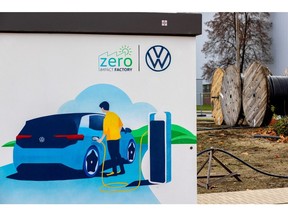Article content
(Bloomberg) — Volkswagen AG is pushing back plans to seek outside investors for its battery unit as prospects for the business dim in a cooling EV market, people familiar with the matter said.
Europe’s biggest carmaker also faces doubts it can make its own batteries at scale, the people said, declining to be named detailing internal matters. The company is no longer prioritizing stake sales or a potential listing of the PowerCo business this year or next, they said.
Article content
The situation remains fluid and VW could still move forward with the plans if the market improves, according to the people. Initial public offerings had their worst year in 2023 in more than a decade, according to data compiled by Bloomberg, following the surge in interest rates. Renault SA on Monday canceled plans to list its Ampere EV arm because of a lack of appetite for listings and slower EV uptake.
Read More: VW’s Battery Unit Faces Supply-Chain Hurdles in Road to IPO
At VW’s capital markets day in June, Chief Executive Officer Oliver Blume said an initial public offering was a tangible option at the right time. Volkswagen said it’s still preparing for “investor readiness from 2024 onwards,” according to a statement to Bloomberg News.
The hold-up is a reminder of the operational risks for carmakers tackling unfamiliar technologies in the shifting auto industry. VW’s struggles to develop software in-house have dealt the carmaker several model setbacks and contributed to the ouster of CEO Herbert Diess in 2022. Across the market, automakers including VW, General Motors and Ford are dialing back their EV ambitions after a few years of surging growth, with orders slowing due to disappearing subsidies, a lack of charging infrastructure and high EV prices.
Article content
On PowerCo, VW is willing to “open the capital structure and continue to evaluate our options against the backdrop of the market environment,” the carmaker said in an email. The ramp-up of EVs is not as steep as expected, but investor interest in PowerCo “remains high,” VW said.
Read More: Hertz’s Tesla Fire Sale Portends an EV Reckoning: Hyperdrive
Reevaluating plans for PowerCo’s long-term funding is another step back from an ambitious push to challenge Tesla Inc. started by Diess. Set up in 2022, the unit plans to invest €20 billion ($21.7 billion) in battery plants to supply cells for 3 million EVs annually.
PowerCo has started construction on two factory sites in Europe, where higher energy prices have clouded investment decisions for many industrial players. Output is due to start in Germany next year and in 2026 in Spain, and early works are underway at a third site in Canada.
PowerCo is developing unified cells designed to fit most of the group’s EV platforms, a strategy that could be a major advantage if the company can pull it off, but also risky. Via its US partner QuantumScape Corp., VW is also looking into solid-state batteries, a technology that promises to make EVs more efficient and less expensive.
Article content
“The question mark is: Can you produce a cost competitive battery?” said HSBC analyst Mike Tyndall. “It’s arguably an existential risk, because if you can’t you’ll always be at a disadvantage.”
Read More: VW Sees Promising Results In Latest Solid-State Battery Test
In June, Thomas Schmall, VW’s technology chief who also chairs PowerCo, said “everything is a challenge” in the battery business due to a lack of top-level experts, critical minerals and equipment to ramp up factories. VW has said it plans for PowerCo to invest in mines to help secure supply.
If VW stays the course, PowerCo will supply half of the carmaker’s battery needs by 2030, creating a behemoth with 20,000 workers. More than 70% of the automaker’s sales in Europe — and more than 50% in North America — are supposed to be fully electric by then.
While the EV market exhibits plenty of mixed signals, sales continue to grow. BloombergNEF expects passenger EV sales to increase 21% in 2024 to 16.7 million, with 70% of those being fully electric. Last year, the market expanded by 33%.
Share this article in your social network

